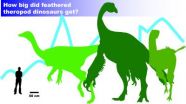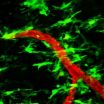(Press-News.org) Fresh insight into the parasite that causes malaria suggests a new way to develop drugs and vaccines to tackle the disease.
Research into malaria parasites – which exist in male and female forms, and mate to spread the disease – suggests that treatments would be more likely to succeed if designed to target female forms of the parasite.
Scientists found that male parasites can adapt to new surroundings faster than the females. When malaria infects the bloodstream after a mosquito bite, the male parasites are better able to react quickly to repeated attacks by the immune system and so are likely to be harder to treat with drugs and vaccines.
Researchers at the University of Edinburgh, who took part in the study, examined the genetic fingerprint of various species of malaria parasites at different stages in their life cycles. They found that genes associated with male parasites tended to evolve faster over time than those of females.
Targeting the females would be more likely to succeed in killing the infection in the long term and would prevent the parasites from breeding and spreading.
The research, carried out in collaboration with the University of Glasgow, Leiden University Medical Centre, Netherlands, and the Institute of Biochemistry and Biophysics in Warsaw of the Polish Academy of Sciences, was published in the journal Evolution, Medicine and Public Health. It was supported by the Wellcome Trust, the European Union, the Polish Ministry of Science and the Foundation for Polish Science.
Dr Sarah Reece of the University of Edinburgh's School of Biological Sciences, who co-led the study, said: "Malaria is notorious for evolving to evade treatment – it is crucial that drugs and vaccines are designed to target the slower, female, form of the parasite."
###
For more information please contact:
Dr Sarah Reece, School of Biological Sciences, tel 07766 548334; Sarah.Reece@ed.ac.uk
Eleanor Cowie, Press and PR Office, 0131 650 6382; Eleanor.Cowie@ed.ac.uk
Malaria study suggests drugs should target female parasites
Fresh insight into the parasite that causes malaria suggests a new way to develop drugs and vaccines to tackle the disease
2012-11-28
ELSE PRESS RELEASES FROM THIS DATE:
For some feathered dinosaurs, bigger not necessarily better
2012-11-28
Every kid knows that giant carnivores like Tyrannosaurus rex dominated the Cretaceous period, but they weren't the only big guys in town. Giant plant-eating theropods – close relatives of both T. rex and today's birds – also lived and thrived alongside their meat-eating cousins. Now researchers have started looking at why dinosaurs that abandoned meat in favor of vegetarian diets got so big, and their results may call conventional wisdom about plant-eaters and body size into question.
Scientists have theorized that bigger was better when it came to plant eaters, because ...
Compound found in rosemary protects against macular degeneration in laboratory model
2012-11-28
LA JOLLA, Calif., November 27, 2012 – Herbs widely used throughout history in Asian and early European cultures have received renewed attention by Western medicine in recent years. Scientists are now isolating the active compounds in many medicinal herbs and documenting their antioxidant and anti-inflammatory activities. In a study published in the journal Investigative Ophthalmology & Visual Science, Stuart A. Lipton, M.D., Ph.D. and colleagues at Sanford-Burnham Medical Research Institute (Sanford-Burnham) report that carnosic acid, a component of the herb rosemary, promotes ...
Increasing drought stress challenges vulnerable hydraulic system of plants, GW professor finds
2012-11-28
WASHINGTON - The hydraulic system of trees is so finely-tuned that predicted increases in drought due to climate change may lead to catastrophic failure in many species. A recent paper co-authored by George Washington University Assistant Professor of Biological Sciences Amy Zanne finds that those systems in plants around the globe are operating at the top of their safety threshold, making forest ecosystems vulnerable to increasing environmental stress.
In the current issue of the journal Nature, Dr. Zanne and lead authors from the University of Western Sydney in Australia ...
GSA Today: Human transformation of land threatens future sustainability?
2012-11-28
Boulder, Colorado, USA - Social and physical scientists have long been concerned about the effects of humans on Earth's surface -- in part through deforestation, encroachment of urban areas onto traditionally agricultural lands, and erosion of soils -- and the implications these changes have on Earth's ability to provide for an ever-growing population. The December 2012 GSA Today science article presents examples of land transformation by humans and documents some of the effects of these changes.
Researchers Roger Hooke of the University of Maine, USA, and José F. Martín-Duque ...
Resolving conflicts over end-of-life care: Mayo experts offer tips
2012-11-28
ROCHESTER, Minn. -- It's one of the toughest questions patients and their loved ones can discuss with physicians: When is further medical treatment futile? The conversation can become even more difficult if patients or their families disagree with health care providers' recommendations on end-of-life care. Early, clear communication between patients and their care teams, choosing objective surrogates to represent patients and involving third parties such as ethics committees can help avoid or resolve conflicts, Mayo Clinic experts Christopher Burkle, M.D., J.D., and Jeffre ...
How to buy an ethical diamond
2012-11-28
BUFFALO, N.Y. -- You've already decided that you're going to pop the question. Now comes another quandary: Where to get the ring, if you're buying one?
The holidays are a busy time for engagements, and Trina Hamilton, a University at Buffalo expert in corporate responsibility, says socially minded consumers have a lot to think about when it comes to finding the right rock.
In recent years, shoppers have turned to Canadian diamonds as news reports and movies exposed the diamond trade's role in fueling armed conflicts in developing countries. (Think "Blood Diamond," the ...
East Asia faces unique challenges, opportunities for stem cell innovation
2012-11-28
Tension is the theme running through the new consensus statement issued by the Hinxton Group, an international working group on stem cell research and regulation. Specifically, tension between intellectual property policies and scientific norms of free exchange, but also between eastern and western cultures, national and international interests, and privatized vs. nationalized health care systems.
The consensus, titled Statement on Data and Materials Sharing and Intellectual Property in Pluripotent Stem Cell Science in Japan and China, was released on the Hinxton Group's ...
Reducing sibling rivalry in youth improves later health and well-being
2012-11-28
UNIVERSITY PARK, Pa. -- Sibling conflict represents parents' number one concern and complaint about family life, but a new prevention program -- designed and carried out by researchers at Penn State -- demonstrates that siblings of elementary-school age can learn to get along. In doing so, they can improve their future health and well-being.
"Negative sibling relationships are strongly linked to aggressive, anti-social and delinquent behaviors, including substance use," said Mark Feinberg, research professor in the Prevention Research Center for the Promotion of Human ...
NIH-funded researchers show possible trigger for MS nerve damage
2012-11-28
High-resolution real-time images show in mice how nerves may be damaged during the earliest stages of multiple sclerosis. The results suggest that the critical step happens when fibrinogen, a blood-clotting protein, leaks into the central nervous system and activates immune cells called microglia.
"We have shown that fibrinogen is the trigger," said Katerina Akassoglou, Ph.D., an associate investigator at the Gladstone Institute for Neurological Disease and professor of neurology at the University of California, San Francisco, and senior author of the paper published ...
Rocks, water, air, space ... and humans: An NSF recipe for AGU success
2012-11-28
The National Science Foundation is suggesting adding a bit of spice to a geophysical scientist's research recipe of rocks, water, air, space and life:
Humans.
At next month's Fall Meeting of the American Geophysical Union (AGU) a behemoth of a conference of nearly 20,000 Earth and space scientists, educators, students and policy makers, an international group of scientists will make the case for adding the human element to their research.
The International Network of Research in Coupled Human and Natural Systems – CHANS-Net – is supported by the National Science ...
LAST 30 PRESS RELEASES:
Natural selection operates on multiple levels, comprehensive review of scientific studies shows
Developing a national research program on liquid metals for fusion
AI-powered ECG could help guide lifelong heart monitoring for patients with repaired tetralogy of fallot
Global shark bites return to average in 2025, with a smaller proportion in the United States
Millions are unaware of heart risks that don’t start in the heart
What freezing plants in blocks of ice can tell us about the future of Svalbard’s plant communities
A new vascularized tissueoid-on-a-chip model for liver regeneration and transplant rejection
Augmented reality menus may help restaurants attract more customers, improve brand perceptions
Power grids to epidemics: study shows small patterns trigger systemic failures
Computational insights into the interactions of andrographolide derivative SRJ09 with histone deacetylase for the management of beta thalassemia
A genetic brake that forms our muscles
CHEST announces first class of certified critical care advanced practice providers awarded CCAPP Designation
Jeonbuk National University researchers develop an innovative prussian-blue based electrode for effective and efficient cesium removal
Self-organization of cell-sized chiral rotating actin rings driven by a chiral myosin
Report: US history polarizes generations, but has potential to unite
Tiny bubbles, big breakthrough: Cracking cancer’s “fortress”
A biological material that becomes stronger when wet could replace plastics
Glacial feast: Seals caught closer to glaciers had fuller stomachs
Get the picture? High-tech, low-cost lens focuses on global consumer markets
Antimicrobial resistance in foodborne bacteria remains a public health concern in Europe
Safer batteries for storing energy at massive scale
How can you rescue a “kidnapped” robot? A new AI system helps the robot regain its sense of location in dynamic, ever-changing environments
Brainwaves of mothers and children synchronize when playing together – even in an acquired language
A holiday to better recovery
Cal Poly’s fifth Climate Solutions Now conference to take place Feb. 23-27
Mask-wearing during COVID-19 linked to reduced air pollution–triggered heart attack risk in Japan
Achieving cross-coupling reactions of fatty amide reduction radicals via iridium-photorelay catalysis and other strategies
Shorter may be sweeter: Study finds 15-second health ads can curb junk food cravings
Family relationships identified in Stone Age graves on Gotland
Effectiveness of exercise to ease osteoarthritis symptoms likely minimal and transient
[Press-News.org] Malaria study suggests drugs should target female parasitesFresh insight into the parasite that causes malaria suggests a new way to develop drugs and vaccines to tackle the disease



